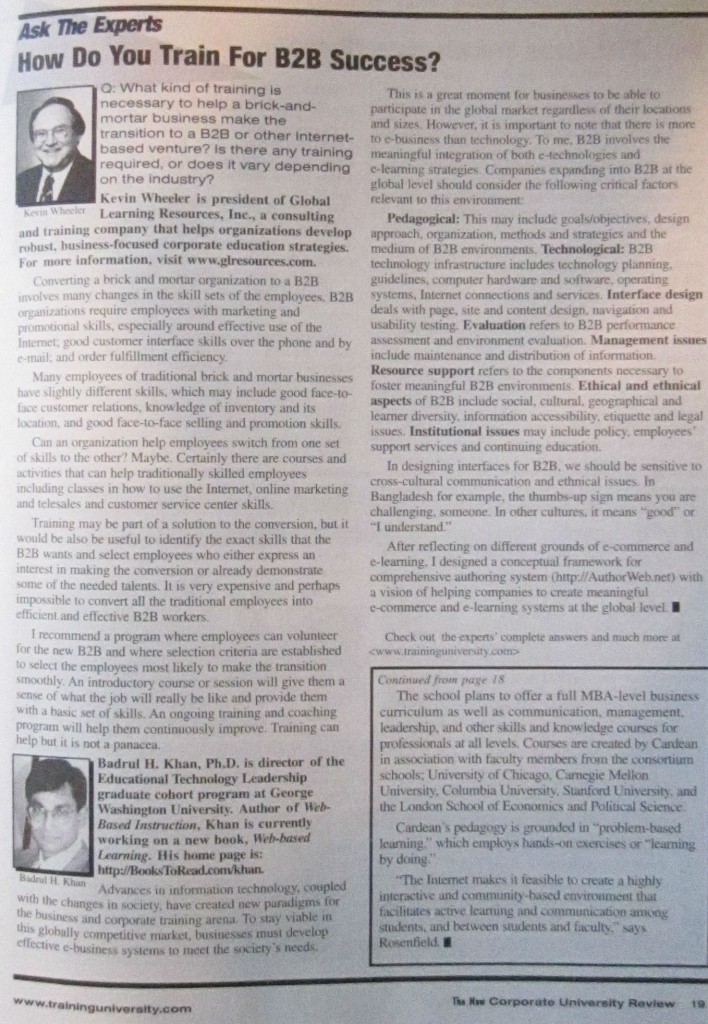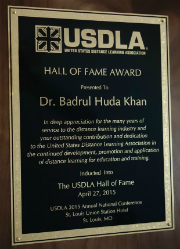
 Scholarly literature including articles, theses, books and abstracts citing the e-learning framework can be search through Google Scholar. Scholarly literature including articles, theses, books and abstracts citing the e-learning framework can be search through Google Scholar. |
The following articles adopted /used the framework (submitted by readers). You can submit an article that uses the e-learning framework.
The Global E-Learning Framework
E-Learning can be viewed as an innovative approach for delivering well-designed, learner-centered, interactive, and facilitated learning environment to anyone, anyplace, anytime, by utilising the attributes and resources of various digital technologies along with other forms of learning materials suited for open and distributed learning environment. A full chapter by Khan
BEST PRACTICES AND STANDARDS FOR E-LEARNING
By Mohamed Ally, Director and Professor, Centre for Distance Education, Athabasca University, Canada. This paper adopts Khan’s Framework as a guiding principle.
Who killed e-learning?
This article considers a number of reasons for the failure of e-learning, and then proposes a model (Khan’s e-learning framework) for integrating learning and business processes to enable sustained organisational learning. By Johannes C. Cronje.
FACULTY DEVELOPMENT FOR E-LEARNING: A MULTI-CAMPUS COMMUNITY OF PRACTICE (COP) APPROACH
Faculty development is a critical process, enabling instructors to remain abreast of new discipline specific content and innovations in the scholarship of teaching and learning. The explosion of online higher education and advances in technology provide examples and rationale for why faculty development for e-learning is needed. Literature on faculty development and e-learning is reviewed and a multi-campus faculty development program using distance technology and a community of practice model for nursing educators will be described. Successful strategies, barriers and an evaluation of the multi-campus faculty development model experience will be presented in a format that allows for replication across disciplines.. The Flexible Framework for E-Learning by Badrul Khan was selected. By Janet Resop Reilly, Christine Vandenhouten, Susan Gallagher-Lepak, University of Wisconsin, Green Bay and Penny Ralston-Berg, The Pennsylvania State University.
72_Full_Online_Amer Saleem Elameer_Modified Khan eLearning Framework
E-Learning in Jordanian Universities, the Case ff Al-Hashemite University
This study explored the case of Hashemite University in Jordan and the implementation of their e-learning system. The study focused on two objectives: the first is to explore four dimensions of Khan’s framework; the pedagogical, interface design, technological, and the evaluation dimensions. The second objective is to evaluate the e-learning system at HU for two dimensions: the pedagogical and interface design, and using different evaluation techniques. By by Emad Abu-Shanab, Yousra Harb
WHAT DO LEARNERS AND INSTRUCTORS OF ONLINE LEARNING ENVIRONMENTS THINK ABOUT ETHICS IN E- LEARNING? A CASE STUDY FROM ANADOLU UNIVERSITY
Ethics in education means, granting educational opportunities to anyone on equal basis; disregarding nationality, gender, ideological differences or mental/physical disabilities. Through this perspective, online learning environments have an important potential, owing to their nature to reach international audiences. Considering the number and diversity of students in e-Learning environments, policies balancing different expectations and studying how the participants perceive ethics in online learning environments are important. During online courses, like in the face-to-face classes; students have to show respect to their instructors and course mates. Taking ethical principles into consideration in e-Learning leads to (1) respect and tolerance among participants, (2) civil relations and interaction based on pre-determined rules. The study uses Khan’s Framework’s ethical considerations for guidance and analysis.
Focus On Stakeholders by Badrul Khan.
An e-learning system is successful when it is meaningful to all stakeholder groups, including instructors, trainers, learners, support staff, and the institution. An e-learning system is meaningful to learners when it is easily accessible, well-designed, learner-centered, affordable, efficient, flexible, and has a facilitated learning environment. When learners display a high level of participation and success in meeting a course’s goals and objectives, this can make e-learning meaningful to instructors. In turn, when learners enjoy all available support services provided in the course without any interruptions, it makes support staff happy as they strive to provide easy-to-use, reliable services. Finally, an e-learning system is meaningful to institutions when it has a sound return on investment (ROI), a moderate to high level of learner satisfaction with both the quality of instruction and all support services, and a low drop-out rate.
Ethics Dimension in E-Learning by Manuela Sarmento and Diamantino Durão
Dimensions of E-Learning by Badrul Khan, Intervir
The future of E-learning as an educational innovation: Factors influencing project success and failure by Alexander Romiszowski
This paper presents a short literature review on critical factors for the success and failure of E-Learning initiatives, as revealed by the experience of researchers and practitioners in the USA. It also presents a brief analysis of the relative success of earlier educational technology innovations, viewed from the perspective of accepted theories of Diffusion of Innovations in society. In some respects, many prior educational technology innovations have followed a theoretically uncharacteristic trajectory of enthusiastic acceptance followed by widespread rejection. Will this be the future scenario for E-learning as an innovation? And if such tendencies do appear in the pioneering “early adopter” countries such as the USA, how many other countries a little later in the process of E-Learning adoption, such as Brazil, avoid the mistakes of the pioneers?
ONLINE LEARNING IN ERGONOMICS AND OCCUPATIONAL RISK PREVENTION: FACING THE URGENCY AND DIVERSIFICATION OF A MASSIVE LEARNING DEMAND by Nuria Talavera
One of the most well-known e-learning frameworks is Khan’s octagonal framework
(Khan 2001), which classify web-based learning issues in eight main categories: institutional, pedagogical, technological, interface design, evaluation, management, resource support and ethical. The purpose of the framework is to avoid relevant factors be overlooked in the design and development of online learning experiences. Khan’s octagonal framework shows the scope and multidisciplinary character of the online learning field, which is being studied from different perspectives and with different goals. In this paper, the eight main categories proposed by khan have been reshaped into four main perspectives: organisational, pedagogical, technological and socio-cultural.
Adopting Knowledge Management in an E-Learning System: Insights and Views of KM and EL Research Scholars by Md. Shiful Islam, Susumu Kunifuji, Motoki Miura and Tessai Hayama,
The 21st Century Alchemist discovers a new learning laboratory by Carole Longden. Paper presented at LSIS-IfL Research Development Fellowship Conference 31st March 2010 University of Warwick.
Technical and Pedagogical Comparative Study of E-Learning Platforms for Open and Distance Learning by Djamal Amalou
The aim of this development project report is to be a guideline for educational institution who wants to create an E-learning based environment, to develop pedagogy on the net, to accelerate the development of web-based courses or develop a resources centre for cooperative work with other institutions. The necessity of implementing E-learning platforms is seen as a first step towards these previous objectives. Being a pre study for a long-term project, this report start by addressing the needs and asking key questions before any move is made. The structure of this report uses Khan’s orthogonal framework. It contains a detailed description of its dimensions such as institutional, pedagogical, ethical and technical. The pedagogical dimension not only describe the classical approaches such the constructivism, behaviourism…and their important value in the teaching of ICT but focuses on the trendy blended learning. This new approach is analysed under various point like the dimension of the blend, the benefits and its challenges.
Towards E-Learning Quality: A Proposal for E-Learning Quality Model by Rosa Gallen.
e-Learning Component Evolution and Integration: A Case Study by Christopher O’Mahony
A Performance-Based Development Model for Online Faculty by Berlin Fang.
- Status of Seafarer CBT and Comparison of IMO CBT Guidance with U.S. CBT
Standardsby Captain Albert R. Stiles Jr., John Dumbleton. - Critical Factors for Effective e-learning
by Davoud Masoumi. - Learning Features in Open, Flexible and Distributed Environmentby Badrul Khan.
- A Learning Framework for Information Literacy and Library Instruction Program at Rugers University Libraries
by Triveny Kuchi, Rebecca Gardner & Roberta Tipton. - Integrating Network, CAD, VR into the Design and Development of Web-Based Computer Graphics Learning Materials
by Wan-Tsai & Shih-Ching Ou. - Snippets: Quick and Meaningful Training Solutions
by Badrul Khan & Laura Granato. - Key Factor for a Fully Online E-Learning Mode: A Delphi Study
by Kum Lang Chin & Patrice Ng Kon. - The People-Process-Product Continuum in E-Learning: The E-Learning P3 Model
by Badrul Khan. - How’s the E-Learning Baby? Factors Leading to Successe and Failure of an Educational Technology Innovation
by Alexander J. Romiszowsky. - Cultural Diversity and Flexible Learning by Lyn Goodear.
- A Comparative Study of Online Learning Environment between Mainland China
and Overseas/ Other Chinese Regions: Experiences from Students
by Zhang Weiyuan. - 100 Pounds of Potatoes in a 25-Pound Sack: Stress, Frustration, and Learning in the Virtual Classroom by Robin Mello.
- A Metadata Model for E-Learning Coordination Through Semantic Web Languages
by Atilla Elci. - E-Learning: Study with One Course Two Environments by Kadri Hendla
- What do Learners and Instructors of Online Learning Environments Think About Ethics in E- Learning? by Elif Toprak and et al.
- Teaching Undergraduate Mathematics on the Internet by Johann Engelbrecht and Ansie Harding.
- Key Success Factors in E-Learning in Medical Education
by Emami H, Aqdasi M, & Asousheh A. - Learning Features in an Open, Flexible, and Distributed Environmentby Badrul Khan. Association for the Advancement of Computing In Education Journal
- eLearning Dialogue
- Training Magazine
- e-Learning Magazine
- eLearn Magazine
- The Technology Source Journal
- Journal of e-Learning and Knowledge Society
- e-learningguru.com
- e-learning Digest July 04|Jan 04 |
Oct 04 - Corporate University Review
- A framework for creating an effective e-learning experience by A. Patrick and D. Barton
- Effect of Cultural Factors on Students of Pakistan by Nazia Hameed, Maqbool ud din shaikh, Fozia Hameed
- Examining Elements of Quality within Online Education Programs in Higher Education by Kaye Shelton & Jody Isernhagen.
- Key Success Factors in E-Learning in Medical Education by HasanEmami and Leila Najafi
- Proyectos Europeos – European centre of excellence for e-learning – E3. . LEONARDO DA VINCI PILOT PROJECT Nº E/02/F/PP-115755
- Assessment model of E-learning for higher education. By Z. Golzari, A.R. Kiamanesh, N.G. Ghourchian, P. Jaafari. Journal of American Science, 2011;7(7)
- Changing Paradigms for E-learning Pedagogy: Social Networking Technologies for Teaching and Learning in Canadian Post-Secondary Institutions by Ben Akoh
- Readiness Assessment Tool for An eLearning Environment Implementation by Cecilia A. Mercado


Pingback: health careers
Pingback: phentermine without prescription
Pingback: diet solution review
Pingback: Firstrowsports
Pingback: http://bra-ahh.com/
Pingback: free surveys for money
Pingback: Business IT Support Toronto
Pingback: business for sale melbourne
Pingback: Escorts Montreal
Pingback: new autoapproveclub
Pingback: car accident attorney Houston, Houston auto accident attorney, Houston Car accident Lawyer,
Pingback: Criminal lawyer wv, criminal lawyers wv, criminal attorney wv, criminal attorneys wv, top criminal attorney wv, top criminal attorneys wv, top criminal lawyer wv, top criminal lawyers wv, Criminal lawyer martinsburg wv, criminal lawyers martinsburg wv, cr
Pingback: Emilia Wilker
Pingback: over the counter std test
Pingback: Page
Pingback: glowworm
Pingback: sms pengar
Pingback: site
Pingback: green coffee extract
Pingback: shop
Pingback: profollica buy
Pingback: su arıtma
Pingback: Adderall
Pingback: Xanax Online
Pingback: Cheap Cialis
Pingback: Ambien Online
Pingback: Cheap Levitra
Pingback: Ativan
Pingback: Cheap Viagra
Pingback: Ambien
Pingback: cialis online
Pingback: Discount Levitra
Pingback: purchase cialis
Pingback: Vicodin
Pingback: viagra online without prescription
Pingback: Purchase Cialis
Pingback: Meridia
Pingback: Meridia
Pingback: viagra
Pingback: Hydrocodone
Pingback: klonopin
Pingback: buy cialis online
Pingback: Xanax
Pingback: Cialis Without Prescription
Pingback: generic viagra
Pingback: buy cialis
Pingback: Buy Adderall
Pingback: Autoapprove List
Pingback: Cialis
Pingback: Autoapprove List
Pingback: http://www.xanaxrxusa.com
Pingback: http://www.klonopin-rx-pharmacy.com
Pingback: http://www.adderallrxusa.com
Pingback: http://www.buyoxycontinpills.com
Pingback: http://www.adderallrxpharm.com
Pingback: http://www.xanaxonline.biz